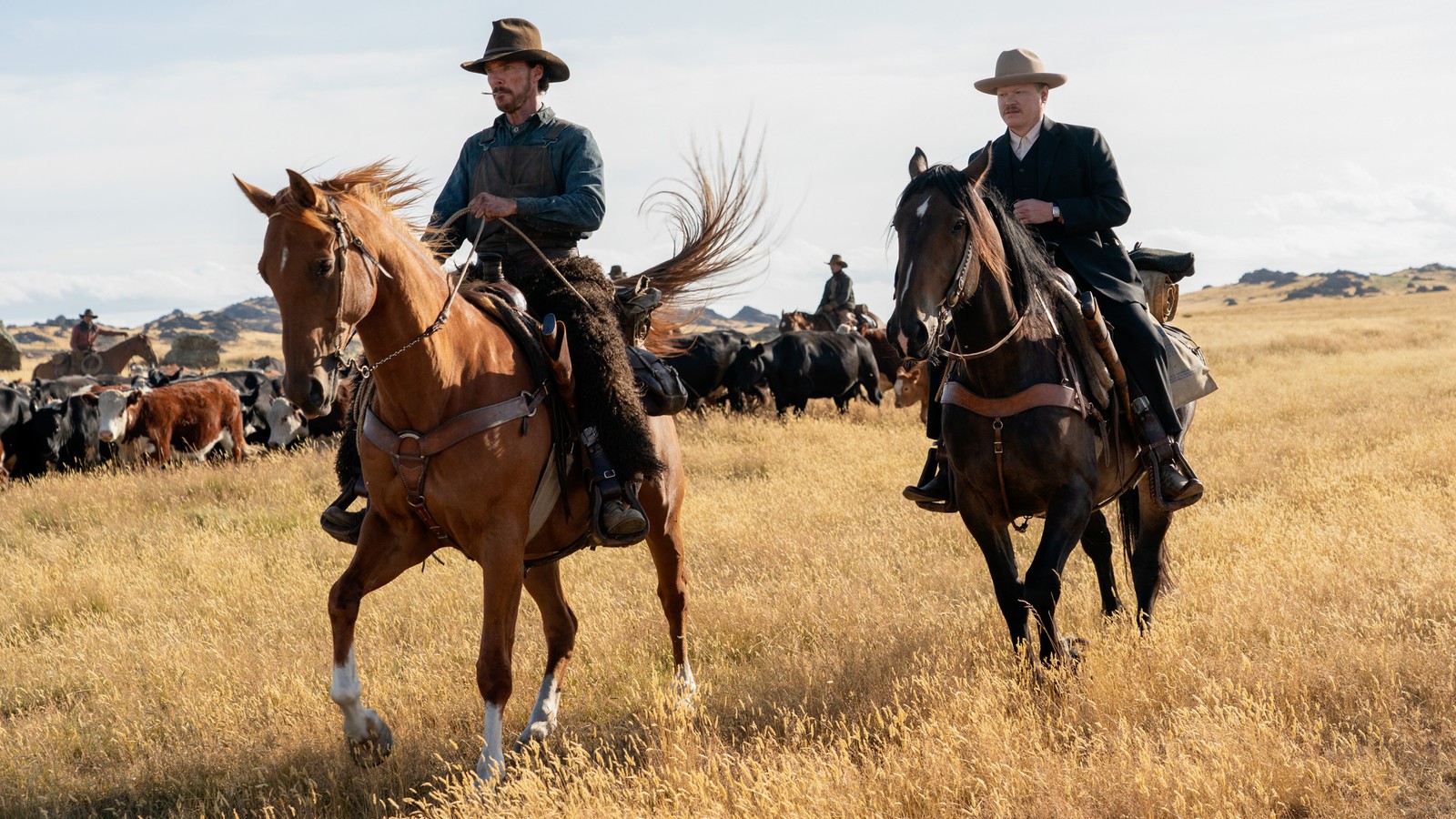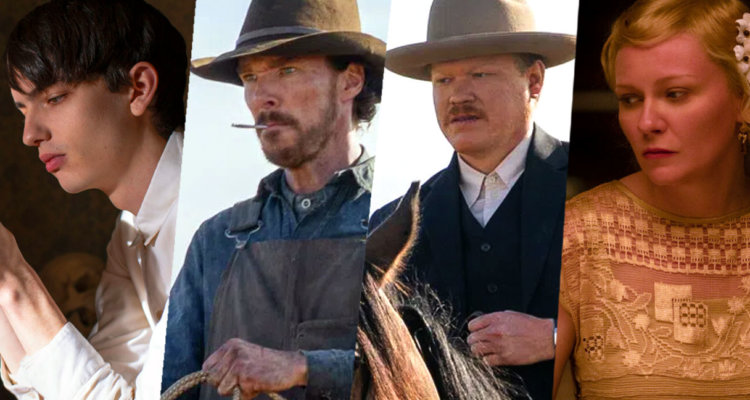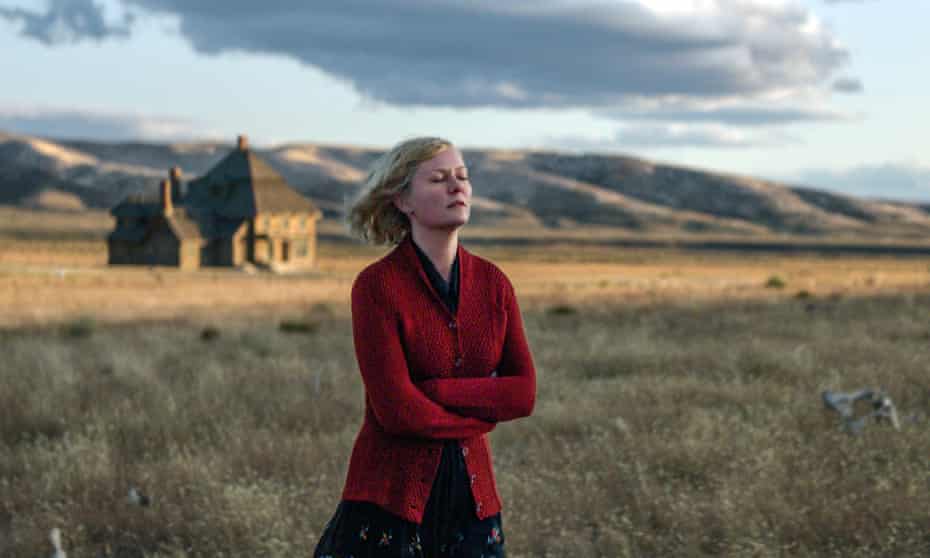Quiet, understated and unhurried, The Power of the Dog is iconic New Zealand filmmaker Jane Campion’s welcome return to our screens. A fascinating, supremely well-acted character study, this is a subtle, beautiful film, that is slow to reveal its charms but takes a deep dive into contemplating the darkness of man.

Montana, 1925. A group of cowboys led by two brothers drive their herd into town. Phil asks his brother George how long it’s been that they’ve been riding together, then informs him it’s been 25 years. They line up shots at the saloon after a hard day’s ride, and then go next door to a guesthouse for dinner. Phil notices the effeminate affectations of the widow owner’s son and begins cruelly mocking him. After they leave for more drinking, George stays behind to settle up and hears the owner (Rose) crying through a door. He offers her a kind ear and this gesture blossoms into a relationship. George marries Rose, and she goes to live at the ranch with the two men.
What follows is a battle of wills as Phil’s status as ranch head is challenged by these new arrivals. Phil does his best to make Rose feel unwelcome. When her son (Peter) finishes at college for the summer, he comes to the ranch and forms an unlikely bond with Phil. What follows is a fascinating interplay between these four characters as their impacts on one another, coupled with some long-buried secrets coming to light, change each of their lives forever.
Brilliant Performances
Perhaps the most striking aspect of the film is the stellar performances from the ensemble. Much has been made of Benedict Cumberbatch’s commitment to “the method” for this film in the press. From spending time on a working ranch in Montana, to refusing to bathe during the shoot, and avoiding Kirsten Dunst in their downtime are just some of the stories that we’ve heard from the set. For all intents and purposes though it appears to have been worth it. Cumberbatch gives the performance of his career (not an easy thing to say given his pedigree). Phil is a hard, bitter man, deliberately rough around the edges and misanthropic towards everyone except his brother. However, as we spend more time with his character we begin to realise that his external prickliness is a reflection of a deeply-held sense of self-loathing. Phil appears to be an angry character and the villain of the piece, but the more that’s revealed, the more that mood changes into one of melancholy and pity towards him.
Another standout is Kodi Smitt-McPhee. Though not given much to do in the first half, his budding friendship with Phil, once he arrives on the ranch, becomes a central point of contention. His mother doesn’t approve of them spending time together, given her rough reception from him. When she raises these concerns, she is largely ignored by the men of the story, leading her character down a dark path. Initially, Peter is portrayed as something of a babe in the woods. But there’s much more to his character than what’s on the surface. Rounding out the principles are Jesse Plemons and Kirsten Dunst, who play the married couple very well (having done so once already on FX’s Fargo). Plemons’ character admittedly does little beyond reacting to the circumstances of the plot, but he’s committed. Dunst fares better as the widow Rose, who has secrets of her own.

Thematic Resonance
Campion’s film is thematically rich, dealing with emotions of jealousy, regret, longing, self-denial. She explores what it truly means to be a man. And given the story is set nearly one hundred years ago, it is this central theme that gives the film its relevance in the modern landscape. Set at a time when notions of masculinity were being challenged – from the ideal of rugged American individualism and self-determination, embodied by the classic cowboy figure, to the move towards industrialisation, education and conformity that would define the 20th century. These two philosophies are embodied in Phil and Peter, as Phil teaches Peter the lessons he learned even as their value fades.
It is through this exploration that Campion manages to tie her film in with today’s audience. Now as then there’s a shift in the way society views masculinity, and through the lens of the changes a century ago, she is able to deftly reflect the changes in modern times. As someone who has asked himself “what does it mean to be a man today?” I found this film to be an interesting look at where we’ve come from, and the steps we have taken. There’s still some ground to cover, obviously, but it is interesting to look at these times in history through what is happening today.
A Gorgeous Setting

The film is, quite simply, beautiful to look at. The high plains of New Zealand make a fine substitute for the prairies of Montana. I would argue – despite some marketing to the contrary – that this film is not a Western in the traditional sense. However, it does employ some of the familiar film-making techniques associated with the genre. In particular, it revels in wide, long shots, showcasing the natural beauty of the landscape while also giving us a sense of scale when the herd of cattle are being moved.
The more intimate settings are also aesthetically interesting. The ranch house itself is quite cavernous as if it were designed to house 20 people, which serves to highlight the isolation of the brothers and the impact of moving Rose and Peter out to live with them. Phil also has a secret swimming hole, and this is a beautiful place to behold.
Campion, Cumberbatch & The Academy
We haven’t seen a Jane Campion film since 2009’s Bright Star, and she has been missed. The Power of the Dog is a timely reminder of why. Her mastery of the craft is on full display in this enthralling film. Those going in expecting a John Wayne-style gun-slinging adventure will be disappointed. But for the increasing audience of grown-ups who are hungry for complex, brilliantly acted, written and directed dramas that deal with real human emotion, The Power of the Dog is a strong reminder of what Hollywood is capable of outside the franchise machine. It’s little wonder that the film is being touted as a late Oscars contender. I wouldn’t be surprised if the film itself, Cumberbatch and Campion all receive nominations.
Check out the trailer here:
The Power of the Dog is now streaming on Netflix and has a limited theatrical release (check local guides).
Subscribe to FIB’s Weekly Breaking News Report for your weekly dose of music, fashion and pop culture news!






